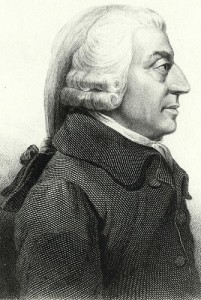They are led by an invisible hand to make nearly the same distribution of the necessaries of life, which would have been made, had the earth been divided into equal portions among all its inhabitants, and thus without intending it, without knowing it, advance the interest of the society, and afford means to the multiplication of the species.
Adam Smith, The Theory of Moral Sentiments, 1759
What are the underpinnings of capitalism and the idea of a laissez-faire free market economy?
Well, if you mean the U.S. version of it, the writings of Adam Smith would be a good place to start.
And this would just happen wholly unbeknownst to the market participants themselves.
Meaning, they would not have to, nor need to, carry out any altruistic motives whatsoever…
in fact that would just muck up the works.
Actually, maybe Smith didn’t mean that at all, but that’s what Milton Friedman, the high priest of modern capitalism, would certainly tell us that he meant.
In fact, the place to which Smith’s reference of an “invisible hand” is most often referred, The Wealth of Nations, is usually taken entirely out of context, since Smith was referring exclusively to the potential evils of foreign trade to the British economy.
Nevertheless, how exactly has this invisible hand idea been interpreted and what are the implications?
What even is this invisible hand?
God?
Now many freedom loving capitalists seem to hold fast to the notion that capitalism is indeed a god-ordained system.
I’m not sure if that’s what Smith was getting at. But certainly he was referring to some sense of an ethereal goodness that would serve as an unseen market governor.
That is, some force of good has to be working behind the scenes, guiding the market forces to work for the good of the whole.
That indeed does sound…good…at least in theory…but how has it worked out in visible practice?
How has the invisible hand been doing?
The results?
Not so stellar.
You see, the underlying force that is driving this market along is self interest…
greed.
Friedman would readily agree with that.
Now greed…isn’t that one of the 7 deadly sins?
Doesn’t sound like good to me.
So a market that is driven along by greed is supposed to just deliver, how mysteriously, a good result for us all?
We can look around and see clearly that it hasn’t in many respects.
Oh yes, it delivers a superb result for some, an increasingly smaller sum, but others are left in the dust.
No, not just “left” there, but often put and/or kept there.
So, does that mean the answer lies in capitalism’s opposite…
a market that isn’t free?
No, because in those cases Marx’s collectivist control always tends to turn out even more corrupt and evil than Ayn Rand’s notion of individualist free reign.
Maybe the answer does not lie with “the system” at all.
How can goodness prevail in a system where people strive to take advantage of one another…in the midst of a zero-sum game?
So that the bounty of the winners is just supposed to somehow inure to the benefit of the losers?
Or, “trickle-down” as they tell us.
the source of the resources without which the “system” has no chance of operating either efficiently…
or at all.
To coin a phrase, it occurs when people are “impact mindful”, not self-interest driven…
not greedy.
I think it’s time that we stop putting our faith in the system…
in the invisible hand…
and start putting it in our own visible hands.
The system has already wreaked it’s havoc on people and planet…
and it is people, you and me, visible hands, that must pick up the pieces and try to put it all back together.
image credit: surfstyle via Compfight cc

[…] by the so-called “invisible hand“… […]